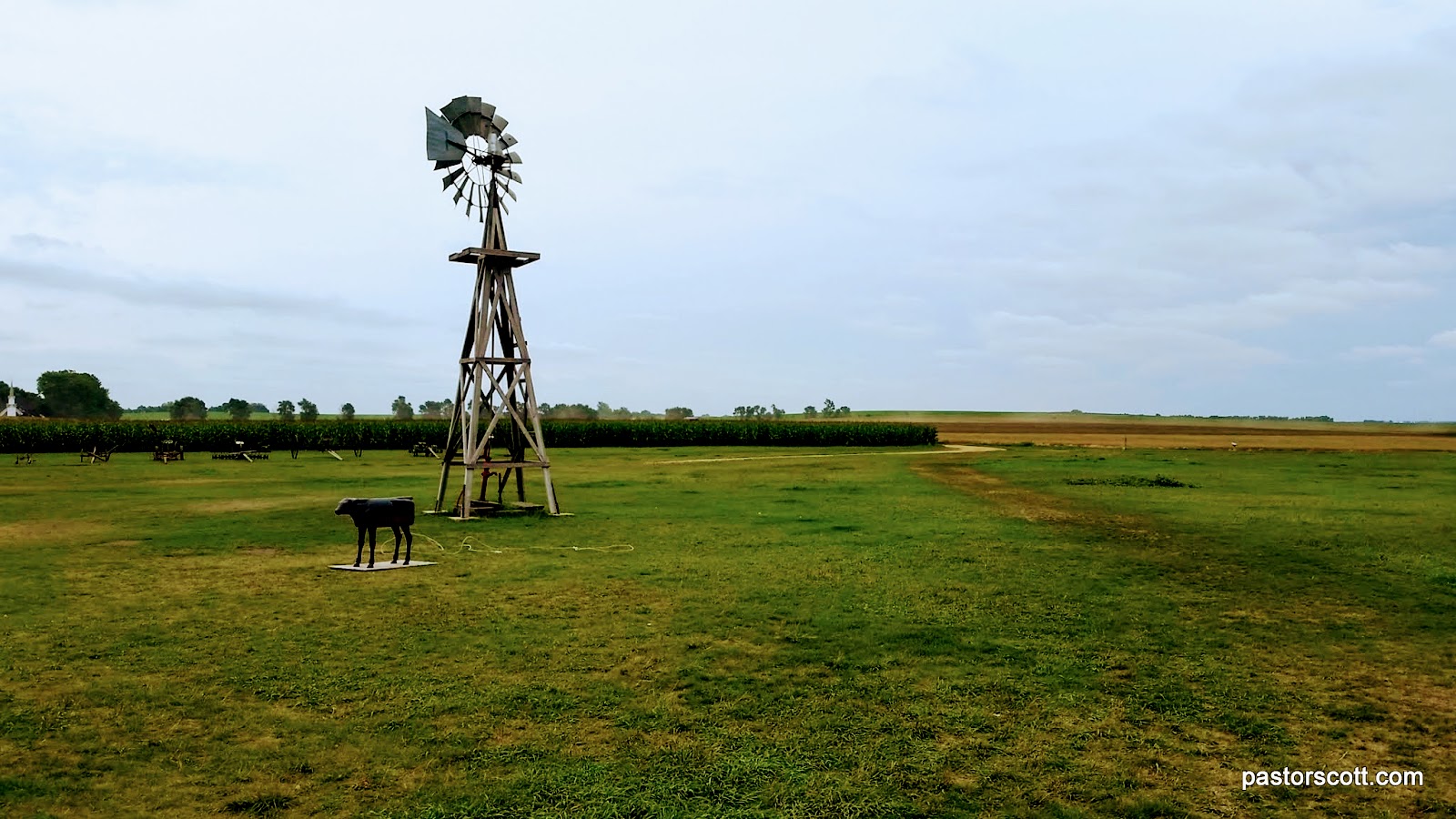
Bring your vessels not a few
2Kings 4: He said, “That’s it. There are no more jugs.” Then the oil stopped.
Clearly the series of stories in the first part of 2 Kings are examples of what a powerful man of God Elisha is. Still, it seems that, like a symphony, each story is a variation on one theme: that when people have faith they act on that faith. These miracles all start with a need and the promise of God. Then, the person has to take action in preparation for God to move. In one story we see soldiers digging ditches in the desert in preparation for water to miraculously flow into them. Now we have a widow with just a little oil being told to go out and borrow jars from everyone she can. When she starts pouring oil out of her meager supply she fills all the jars she collected. It’s only when she runs out of jars that she runs out of oil. So often we take our needs to God and then stand back to watch what he does. However, in this, and the other stories, we see that God invites us to partner with him in what he does for us. No doubt, he does the greater work; after all, anyone can collect jars. Only God can fill them all from such a limited supply. Lord, help me to be a “jar collector.” Help me to be a person doing my part in working with you as you accomplish your purposes in my life and in this world.
Take Away: What does the Lord call you to today that will prepare for what he intends to do in your life tomorrow?
Category: Pastor Scott
Devotional on 2 Kings

Desperate faith
2Kings 4: “She said, “Everything’s fine.”
This is a surprisingly powerful story. Elisha the man of God promises a woman from the town of Shunem that she’s going to have a son. The child is born the following year. A few years later the little boy becomes suddenly ill and dies. His grieving mother seeks out Elisha. As she’s coming she encounters the servant of Elisha first. Clearly something’s wrong, but when Gehazi asks her how things are, her reply is “Everything’s fine.” It’s only when she gets to Elisha that she pours out her heart. Elisha goes to the lifeless child and performs a miracle, raising him back to life. While I see that this is another story intended to show me how powerfully God is working in the life of the prophet, I’m drawn to the Shunammite woman. If there’s ever an example of desperate faith it’s here. Her heart is broken as she lays her dead son on the bed. The only thought on her mind is to get to the man of God, the miracle worker who promised the son in the first place. She desperately wants to believe he can make things right, but looking into the face of such loss it’s nearly impossible. Knowing that, she realizes she has to get to Elisha as quickly as possible, and, instinctively, she knows that even saying the words, “my son is dead” will destroy the mustard seed of faith to which she clings. How is it that “it is well” in her life? It’s because she’s holding on to God with her last ounce of spiritual strength. This is miracle-working territory. Without a cross or an empty tomb she believed the impossible. God can do a lot with faith like that.
Take Away: All it takes is faith the size of a mustard seed to see miracles take place.
Devotional on 2 Kings

Apples or fish
2Kings 4: They not only ate, but had leftovers.
During our Lord’s ministry some of the people think Jesus is possibly one of the prophets of old, resurrected from the dead. It might be that they’re thinking of this incident. In fact, Luke’s report of the suggestion that Jesus is a resurrected prophet comes right after Jesus feeds the five thousand. In this case Elisha feeds, not thousands, but a hundred; and not with bread and fish but with bread and apples. It’s a different day in which a different man provides and different main course. But it’s the same God. Because of that the lessons are the same. One lesson is that “little is much when God is in it.” Another is that I can trust the Lord with my meager resources; he can make better use of them than I can anyway. Whether I’m thinking about Elisha or Jesus or apples or fish it’s good to be reminded that when I give my all to the Lord he does wonderful things.
Take Away: The Lord takes the little bit that’s our all and does more with it than we ever could.
Devotional on 2 Kings

Making it harder than it really is
2Kings 5: If the prophet had asked you to do something hard and heroic, wouldn’t you have done it?
It’s one of our favorite stories from 2 Kings. Naaman is the General of the Army of Aram, a nation that has a long and contentious relationship with Israel. He’s a brave and capable warrior who’s well respected in his homeland. Yet there’s one terrible affliction that not only haunts him, but is probably killing him. Naaman has leprosy. When he hears that there’s a man of God in Israel who heals people of this terrible disease he travels there, prepared to pay handsomely to be cured. To his dismay, Elisha doesn’t even meet him in person, but instead sends a mere servant with what sounds like a silly command: take seven baths in the muddy Jordan to be healed. Furious and humiliated, he turns on his heel to leave, but an old family servant gives the great general the best advice of his life. If Elisha had told him to do some great thing (for instance, pay a king’s ransom) to be healed, he’s prepared to do that. Why not, then, do some simple thing like, “take a bath and be clean.” Naaman listens and the result is a miracle of God and a happy ending to the story. I think I need to pay careful attention to Naaman’s story in my dealings with God. I’m ready to do the great thing like following some demanding course of action or making some big sacrifice as I follow the Lord. While stuff like this is sometimes a part of being a disciple more often than not it’s much less spectacular. “If you want to be my disciple follow me,” the Lord says. I respond, “You’ve got it Lord – I’ll serve you to the ends of the earth, I’ll make great sacrifices for you, I’ll be an example of total surrender to God.” The Lord says, “Tell you what, if I want you to do that stuff, I’ll tell you. For now, how about just walking with me?”
Take Away: What little thing is the Lord calling you to do today?
Devotional on 2 Kings

Do you see what I see?
2Kings 6: Don’t worry about it — there are more on our side than on their side.
The Lord has been revealing to Elisha the military plans of nearby Aram and Elisha has, in turn, told those plans to the King of Israel. Because of that, Elisha has become a prime target. In fact, on this morning in the town of Dothan Elisha awakes to find the whole town surrounded by his enemies. To Elisha and his servant this is more than an inspirational Bible story: its life and death. His servant is mystified by Elisha’s calmness in the midst of his pending capture. That is, he’s mystified until Elisha prays that this young servant will see what he sees. Surrounding the army that surrounds them is a “whole mountainside full of horses and chariots of fire.” With God’s army escorting him Elisha has nothing to fear from the army of Aram or anywhere else for that matter. God didn’t send the army of Aram that day, but he was prepared for it to come. Had Elisha been captured, well, that would have been an unwelcome thing for Elisha and company, but it could only happen if God allowed it to happen. Elisha might have been more aware of it than I am, but the Lord’s army is escorting me too. That doesn’t mean that everything always works out just the way I want. Still, difficult days only come if he allows it, and in the end, I have the assurance that victory will be mine.
Take Away: The Lord walks through life with us, even when we aren’t aware of his presence.
Devotional on 2 Kings

A tale of four lepers
2Kings 7: Let’s go tell the good news.
The capital city, Samaria, is under siege and the result is a terrible famine. Things can’t get much worse there and people are being driven to horrible acts of desperation. Four lepers decide they have nothing else to lose. They’ll throw themselves on the mercy of the invaders. If they’re executed, they’ll die a quicker death than they would die by starvation anyway. When they arrive at the camp they’re surprised to find that there’s no one there! God has moved bringing terror to their camp. The mighty army has fled in panic not even knowing why they were running. The lepers have the time of their lives, eating their fill and ransacking the place. It’s at that point that one of them says to his friends, “We aren’t doing right. Back in Samaria people are starving to death while we’re enjoying all this bounty.” This real life story is also a parable for Christians everywhere. Like the lepers we’ve discovered something wonderful. Meanwhile there’s a world that desperately needs to know what we know. Like those lepers, if we aren’t telling we aren’t doing the right thing.
Take Away: I found it, but I’m glad to share it with you.
Devotional on 2 Kings

What are the chances?
2Kings 8: This is the woman! And this is her son whom Elisha brought back to life!
Elisha’s servant, Gehazi, is chatting with the king about Elisha. When the king asks to hear some of the stories of this spiritual giant’s life Gehazi begins recounting some of the high points of Elisha’s ministry. One of the stories he tells is that of a woman whose son died. When Elisha arrived, he prayed and the son came back to life. Even as the king considers such an amazing thing a woman and her son are brought in for an audience with the king. Her concern is property rights and such matters are a big deal for these descendants of Abraham. Gehazi can hardly believe his eyes. It’s the very woman and son that he’s just been talking about! Because of that, the king is quick to give the woman justice and maybe even a bit more. Is it happenstance that the servant of Elisha just happens to be visiting the king that day? Is it mere chance that when the king asked for some “Elisha stories” that Gehazi decides to talk about the resurrection of a certain woman’s son? Is it just coincidence that she shows up just as Gehazi finishes his story? I don’t think so. This has “God at work” written all over it. I don’t live out on the mystic edge of life about stuff like this. I do think that simple coincidences do happen. However, as I’ve heard somewhere, I’ve noticed that when I pray coincidences seem to happen more often. As I read this story today it’s nice to be reminded of that.
Take Away: The Lord has a way of creating happy coincidences for his people.
Devotional on 2 Kings

Run for your life
2Kings 9: Then open the door and get out of there as fast as you can.
The final chapter on the story of wicked Ahab and Jezebel is about to be written. Ahab is already dead, killed in battle, and now his son Joram sits on the throne of Israel. However, the Lord is about to keep his word that this family will not remain in power. Elisha sends a “junior prophet” to General Jehu. The prophet is to anoint him king and then he’s to run for his life. Apparently, Jehu doesn’t need much of a nudge to mount a coop and take over the country and almost immediately he moves decisively against Joram and his mother Jezebel. I’m interested in the order of Elisha that his representative name Jehu king and then get away from him as quickly as possible. Apparently, in spite of his being anointed king, Jehu remains a heartless, wicked man who’s going to be used of God but will never be a man of God. Elisha doesn’t want his associate to have any more contact with such a man than is necessary. If that’s correct, the lesson is that God’s people sometimes need to make alliances with those who are far from being righteous. We’re to work with them to accomplish some greater good but we’re also to be careful to remember who we are and not allow ourselves to be pulled into their lifestyles.
Take Away: While the Lord uses unlikely and unworthy people to accomplish his purposes, his people should be careful in their connections to them.
Devotional on 2 Kings

Missed opportunity
2Kings 10: God doing what, through Elijah, he said he’d do.
I don’t like reading the stories of uprisings, murders, and judgment found in the stories of Judah and Israel. Beheadings and assassinations somehow don’t make for good devotional reading! Still, there are some powerful themes in the story of Jehu’s uprising. God had judged Ahab’s sin years earlier, and even though he has, at times, blessed Israel with his help against her enemies, the Lord never overlooks what Ahab has continued doing. At the right time the Lord raises up Jehu to act in judgment on Ahab’s family. It’s bloody but it’s intended to give Israel a chance to return to the path that they left so long ago. Before Jehu’s finished Ahab’s family is destroyed and the altars of Baal are gone. In spite of all that, Jehu’s a disappointment. I see here that the Lord uses less than perfect vessels to accomplish his purposes. Also I’m reminded that no one has to fail. Jehu let a golden opportunity slip through his fingers.
Take Away: The Lord works in and through imperfect people to carry out his plans.
Devotional on 2 Kings

Ready or not, here it comes
2Kings 11: Athaliah, oblivious to his existence, ruled the country.
Jehu’s purge nets both Joram, wicked king of Israel, and Ahaziah, the king of Judah who has become a partner with Joram in his sinful leadership. Ahaziah’s mother, Athaliah, takes her son’s place, not only on the throne but also as one committed to evil. Her first act is to kill anyone in her family who might contest her claim to the throne of Judah. It appears her plan has worked, and it would have, except for the bravery and quick action of Jehosheba who hides the infant Joash from his own grandmother’s murderous intention. Now, six years later, it’s time to act. Intrigue abounds as plans are made to dethrone the pretender Athaliah and elevate Joash to his rightful place as boy king. As this takes place we’re told that Athaliah is “oblivious” to it all. I think the Lord often works like this. Ordinary people and even the wicked pursue their goals, pressing on, thinking everything is working out as anticipated. Meanwhile, God is at work in the underground. Big things are coming and we’re “oblivious” to it all. For Athaliah it means that her hijacking of the throne of Judah is soon coming to a bloody end. For followers of the Lord, it means that we’d better keep our eyes on Jesus and be ready for — well, be ready for “whatever” comes next.
Take Away: Even when we can’t see it, the Lord is at work, preparing for the next big thing.
Devotional on 2 Kings

Covenants
2Kings 11: Jehodiah now made a covenant between God and the king and the people. They were God’s people.
A seven-year-old boy sits on the throne of Judah. His mentor is the priest Jehodiah, a man committed to God. As Joash is installed as king the priest makes a covenant with God on behalf of the young king and his people. Joash will rule the nation “under God” and the people will view themselves as “God’s people.” A second covenant promises that Joash will rule justly and the people will willingly live as citizens under his rule. These covenants will stand for 40 years, throughout the lifetime of Joash. Covenants are powerful things. They bind people together and commit them to certain courses of action. They create a roadmap for relationships and behaviors. Covenants are commitments between two or more parties, a contract of sorts. The people of Joash’s day are impacted by the covenant for a lifetime. What am I committed to that has that level of impact? Or, maybe better said, is what I’m committed to worth the effort? How about you? Are your covenants worth keeping? The Lord has offered one covenant that is worth everything. It’s the one sealed with the blood of Jesus.
Take Away: Are the covenants of my life worth keeping?
Devotional on 2 Kings

Building fund
2Kings 12: Why haven’t you renovated this sorry-looking Temple?
The sample we’re given of Joash’s leadership of Judah is his faithfulness to repair the Temple of God. Any building will deteriorate if it is not cared for and Joash realizes that the Temple is overdue for some serious work. He orders the priests who serve there to use offerings for that purpose, but it never happens. Instead of being used on the building, the money is absorbed in the everyday operations at the Temple. When Joash sees this, he changes tactics and creates a system by which money can be given for this specific purpose. The people respond and during his reign Joash sees the Temple restored to much of its former glory. So what do I see in this incident? First, I’m reminded that the building where worship takes place needs regular attention and that the Lord gifts some people for this task. The church needs to recognize that and both finance and empower these people for their work. Second, I see that without leadership things gradually fall apart. In this case, not only is the building deteriorating, but the plans for financing the renovations also come apart without Joash’s leadership. It isn’t enough for him to have the vision and then put a plan together. He has to be sure that the plan continues to completion. Third, I see that the best way to finance such an operation is with money specifically given for that purpose. The expenses of the Temple continue even through the building project so the money has to be given above the regular offerings. Finally, I see that people are willing to give to such a project. People don’t have to be brow beat to give if they see the need and that something is really happening. Clearly, these are good principles for today even as they were good so long ago.
Take Away: Leadership not only provides vision and plans. It also stays engaged as the vision is made reality.
Devotional on 2 Kings

Temporary repentance
2Kings 13: It didn’t make any difference: They didn’t change their lives.
Jehoahaz takes his father’s place on the throne if Israel but there’s no religious reform. Instead, he continues down the path of God-ignoring idol worship. As happened during the time of the Judges, God allows the enemies of Israel to come in and dominate them. For years the people are miserable in this sorry state of affairs. Finally, Jehoahaz humbly comes to God confessing his sins and the sins of the people. In his mercy, God answers, raising up a warrior who drives the invaders out. Of course, this results in a great revival of Jehovah worship. At least it should have. Without missing a beat they continue their idol worship with hardly a tip of the hat to God. Once again, I see here the mercy and patience of God. No question, he wants to care for us and to bless our lives. Also, there’s the truth that mere human freedom is not the ultimate need of man. Don’t get me wrong, I believe in freedom and thank God for it. However, the greatest need of humanity is not for liberty. Rather, the need is for changed hearts. Otherwise, everything else is just window dressing.
Take Away: Everything else comes up short when compared to the transformation the Lord brings to lives.
Devotional on 2 Kings

Little deals are sometimes big deals
2Kings 13: The king struck the ground three times and then quit.
The old prophet Elisha is nearing the end of life. Unlike his mentor, Elijah, he’ll not depart this world in a whirlwind. Instead, he’ll die from old age and illness. However, before he goes, he has good news for Jehoash, king of Israel. The king is instructed to fire an arrow in the direction of his enemies. Then Elisha instructs him to strike the ground with the remaining arrows. Obviously, this is supposed to be an action related to their struggle with Aram but the king only strikes the ground a few times and stops. Elisha tells him that what he does isn’t good enough and that his minimum cooperation is symbolic of the few times he’ll defeat Aram. Had he responded with enthusiasm and commitment things could have been different but his token response will result in only a token defeat of Aram. The wise man of Ecclesiastes says, “Whatever your hand finds to do, do it with all your might” (Eccl. 9:10). Had Jehoash been ordered to actually go into battle he would have, no doubt, done it with “all his might” but since this was merely symbolic he just gave a token effort. With that, Elisha and, apparently God, is displeased. So as I read this story I’m reminded that things that appear to me to be a “little deal” are sometimes a “big deal” in God’s eyes.
Take Away: If the Lord says “do it” then do whatever it is with everything you’ve got.
Devotional on 2 Kings

A trophy of grace
2Kings 13: He never gave up on them, never even considered discarding them.
In spite of God’s patience and blessings and in spite of the difficulties the nation faces, Israel continues down a destructive path. When things are terrible they temporarily turn to God but before long they’re back in the old God-ignoring rut. Their future could have been bright, but that’s not how things are going to turn out. I know what happens over at the end of 2Chronicles when the twin kingdoms come to their official end. Then again, I know what happens on the next page after that where I see God’s faithfulness through the priest, Ezra. In fact, looking into their future as I can by simply turning the pages of my Bible I’m taken by the truth of this statement: “He never gave up on them.” Oh, the grace of God who clearly sees our failure yet declares, “I won’t even consider discarding you.” I’m a trophy of such grace. And so are you.
Take Away: God is the God of Second Chances…and third…and fourth…and….
Devotional on 2 Kings

A chip off the old block, almost
2Kings 14: He lived the way God wanted and did the right thing. But he didn’t come up to the standards of his ancestor David.
When Joash is assassinated his son, Amaziah, becomes king of Judah. This young man picks up where his father left off: doing the right thing and honoring God. Because of that, he goes down in history as one of the good kings of Judah. This man rules for 29 years and, over all, does what is pleasing in God’s sight. Still, I can’t get past the statement that “he didn’t come up to the standards of David.” In other words, Amaziah does “okay” and receives a passing grade from the Lord, yet he could have been much more. You might say that David earns an “A” while Amaziah earns a “C+.” It’s too bad when a person has great potential yet, while things aren’t a complete disaster, never quite measures up. Do you know what really bothers me here? I’m not as concerned about Amaziah’s lukewarm reviews as I am of my own! Can it be said of me, “Well, he did the right thing, but he never measured up to his full potential.” I don’t want to live a lukewarm life.
Take Away: Oh Lord, set me on fire for you.
Devotional on 2 Kings
Leadership and accountability
2Kings 14: God wasn’t yet ready to blot out the name of Israel from history, so he used Jeroboam son of Jehoash to save them.
Jeroboam II, king of Israel is another in the line of leaders of Israel who doesn’t make the grade. He could do better. In fact, he should. Instead he continues the march away from God, even as so many of his predecessors have done before him. Leaders can’t force morality but they can model it. Beyond that, leaders, even especially powerful ones, must give account of themselves to Almighty God. Still, Jeroboam has some successes: military victories that win back territory that’s been lost to their enemies. We’re told here that God is helping Jeroboam do that, not because he favors this pitiful king but for his own purposes. Although the day of destruction and defeat is coming, for now the Lord isn’t ready for Israel to be defeated. Because of that he helps Jeroboam lead Israel in some specific ways. This is good for Israel. Still though, Jeroboam will face a God who’s displeased with him. I see here that even though God acts according to his own agenda it doesn’t get people off the hook when they fail of their own free will.
Take Away: Ultimately, we will each give account of ourselves to the Lord.
Devotional on 2 Kings

Nothing special, just life
2Kings 15: He was king for fifty-two years in Jerusalem.
The stories of the twin kingdoms are told in parallel but they’re very different stories. Judah is rather stable with kings generally ranked as “good with some failures” while kings of Israel receive failing marks. Because of that, God blesses Judah with consistency of leadership that’s lacking in Israel. In fact, Israel’s throne at this time has the feel of a revolving door. There are numerous assassinations and one fellow, Shallum, only manages to hold the throne for a month. Meanwhile, Azariah and his son Jotham, rule Judah for 68 years. Judah isn’t perfect, but there’s a spiritual, God-connected element that’s missing from Israel and during this period of their histories one place we see it is in the stories of their kings. While intrigue and subterfuge make for the best stories, I think most citizens will say that peace, security, and prosperity make for the best lives. Israel might be more often talked about in the region but Judah’s the better place to call home. Thank God for the blessing of living, more often than not, a life that doesn’t make the headlines.
Take Away: We tend to take common, day to day life for granted; but we shouldn’t.
Devotional on 2 Kings

Put that altar right back where you found it
2Kings 16: The old bronze Altar that signaled the presence of God he displaced from its central place.
The march of the kings of Israel and Judah continues as I read through this book of Kings. A few get passing marks, although no one earns an “A.” Most, though, are viewed as failures. Ahaz of Judah is singled out as an example of major failure. We’re told that he put his own son to death in a pagan “passing through the fire” ritual. When the country is under attack he never considers calling out to God. Instead, he pays the king of Assyria a “king’s ransom” to rescue him from his enemies. Much of the payment comes from stripping the Temple of its gold and silver. Once the war is over, Ahaz visits his new master in Damascus. The altar of pagan worship there really impresses him, so he has a copy of it made. He moves off to the side the old Altar that has served for many generations as the place for sacrificing to the Lord God and replaces it with his “new and improved version.” Of course, this isn’t told in praise of Ahaz. Instead, it’s told as an example of his spiritual failure. Today, I am not thinking so much about replacing the old church pews with new chairs or even replacing the old altars (mourner’s benches) with something more modern. Rather, I’m thinking that there are some basic elements to our relationship with the Lord that can’t be “upgraded.” Consider, for instance, the spiritual basic of prayer. It’s irreplaceable. We talk a lot about the importance of prayer and for good reason; it’s as central to spiritual life as is breathing to physical life. It’s not that big of a deal to change the type of songs we sing to something more modern, or to add some new technology to assist in worship. However, it’s a big deal to downgrade the importance of a spiritual discipline like prayer or the reading of the Word. We mustn’t push these fundamentals off to the side to make room for some new worship “innovation.”
Take Away: Be sure to keep central things central.
Devotional on 2 Kings
The nation that ignores God
2Kings 17: They lived a “nothing” life and became “nothings.”
The 17th chapter of Second Kings is the epitaph of the Kingdom of Israel. After centuries of ups and mostly downs they exhaust the patience of God. The Lord hands them over to their enemies and the citizens are removed from their beloved land to live in exile the rest of their days. God’s verdict is clearly stated: “the exile came about because of sin…they had accumulated a long list of evil actions and God was fed up…God said, ‘Don’t!’ but they did it anyway.” For decades it has appeared that they can brush God Jehovah off and do things their own way. They’ve behaved as though his Commandments are mere suggestions that don’t really apply. Traveling that road has brought them to its only possible destination and now they’ve arrived: “they lived a ‘nothing’ life and became ‘nothings.'” What happens to a nation that’s been abundantly blessed by God but persistently chooses to ignore him and his ways? This chapter ought to really frighten us.
Take Away: The future is dim for a nation that ignores the Lord and his blessings.
